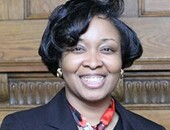Some Thoughts on 'Thoughts and Prayers' After Mass Shootings
Dr. Jessica A. Johnson
The East Lansing community is still reeling from the Michigan State University mass shooting last month that resulted in five students being critically wounded and three losing their lives. The students who tragically passed away -- Arielle Anderson, Alexandria Verner and Brian Fraser -- all had bright futures ahead of them. Arielle had aspirations of becoming a doctor, Alexandria was majoring in biology and Brian was studying business. The Michigan State massacre was the 67th mass shooting to occur in the country this year, according to the Gun Violence Archive, a nonprofit research organization that uses news stories and police reports to compile incidents involving firearms. We were only 44 days into 2023 when MSU students faced a gunman on campus, another chilling example of the gun violence epidemic that continues to plague America.
The MSU shooting is no longer a major news story, but I've continued to think about the controversial statement that Ranjeev Puri, the Democratic Majority Whip in the Michigan House of Representatives, made regarding it on Feb. 14. Out of frustration and anger, Puri tweeted, "F--- your thoughts and prayers" and asserted that "all we have offered up are empty solutions -- traumatizing active shooter drills and bulletproof backpacks." However, he did go on to say that "(t)houghts and prayers without action and change are meaningless."
When I first read Puri's tweet, I was shocked and a little hurt because as a Christian I do believe in the power of prayer. The latter part of James 5:16 tells us that the "effectual fervent prayer of a righteous man availeth much," with the Greek translation of "fervent" meaning to be active and efficient. Yet, I also understood why Puri felt the phrase "thoughts and prayers" has become an empty platitude in response to gun tragedies. It's a straightforward statement that's easy to tweet or type in a message board after a shooting happens, especially when our families and communities have not been directly touched by a catastrophic loss of life. I believe Puri's blatant criticism that our thoughts and prayers are hollow without action should be a clarion and motivating call for more churches and pastors to become involved in the fight against gun violence. Churches cannot afford to be silent on this issue as shooters prey on houses of worship in addition to viciously targeting schools, shopping centers and other public spaces. It was discovered that the Michigan State shooter had a long list of targets that included a church after he killed himself.
On news sites geared toward an African American audience, I have often read comments asking where the church is, and I have seen complaints from people who are extremely disappointed in what they view as the church's lack of influence in the wake of violent national tragedies. It reminds me of something Martin Luther King Jr. said in his "Letter from Birmingham Jail" as he addressed the bombings of Black churches in the city and other racial and social injustices during the early 1960s. Although King was primarily writing to White clergymen, his plea for churches not to be lax and find comfort in social neglect is still relevant for our present time as we face an ongoing battle against the nation's gun epidemic. King urged that the church through faith in God become "a thermostat that transform(s) the mores of society," and some pastors who are actively following this philosophy and working in their communities to prevent gun violence are those who belong to Brooklyn's 67th Precinct Clergy Council, known as the "GodSquad." These ministers work with the Brooklyn district attorney's office as mediators between law enforcement and primarily African American neighborhoods, and they provide what they call "victim services" to families struggling with the loss of a loved one to a shooting. As one minister stated in an interview cited by The Center for American Progress, "We try to pattern ourselves after Jesus and make sure that we don't get stuck in the church's four walls and that we are able to touch the lives (of people)."
Not getting stuck, whether it be in the church or becoming complacent with gun polices that have not been effective, is what I believe Puri and all of us who are concerned for the safety of our children and communities want to see in the aftermath of the Michigan State killings. We definitely need to keep praying, but we also must also engage in civic and faith-based work for our prayers to have a meaningful impact.
Dr. Jessica A. Johnson is a lecturer in the English department at Ohio State University's Lima campus. Email her at smojc.jj@gmail.com. Follow her on Twitter: @JjSmojc.
Photo by Timothy Eberly on Unsplash







You must be logged in to post stack comments. Please Login or Signup (free).